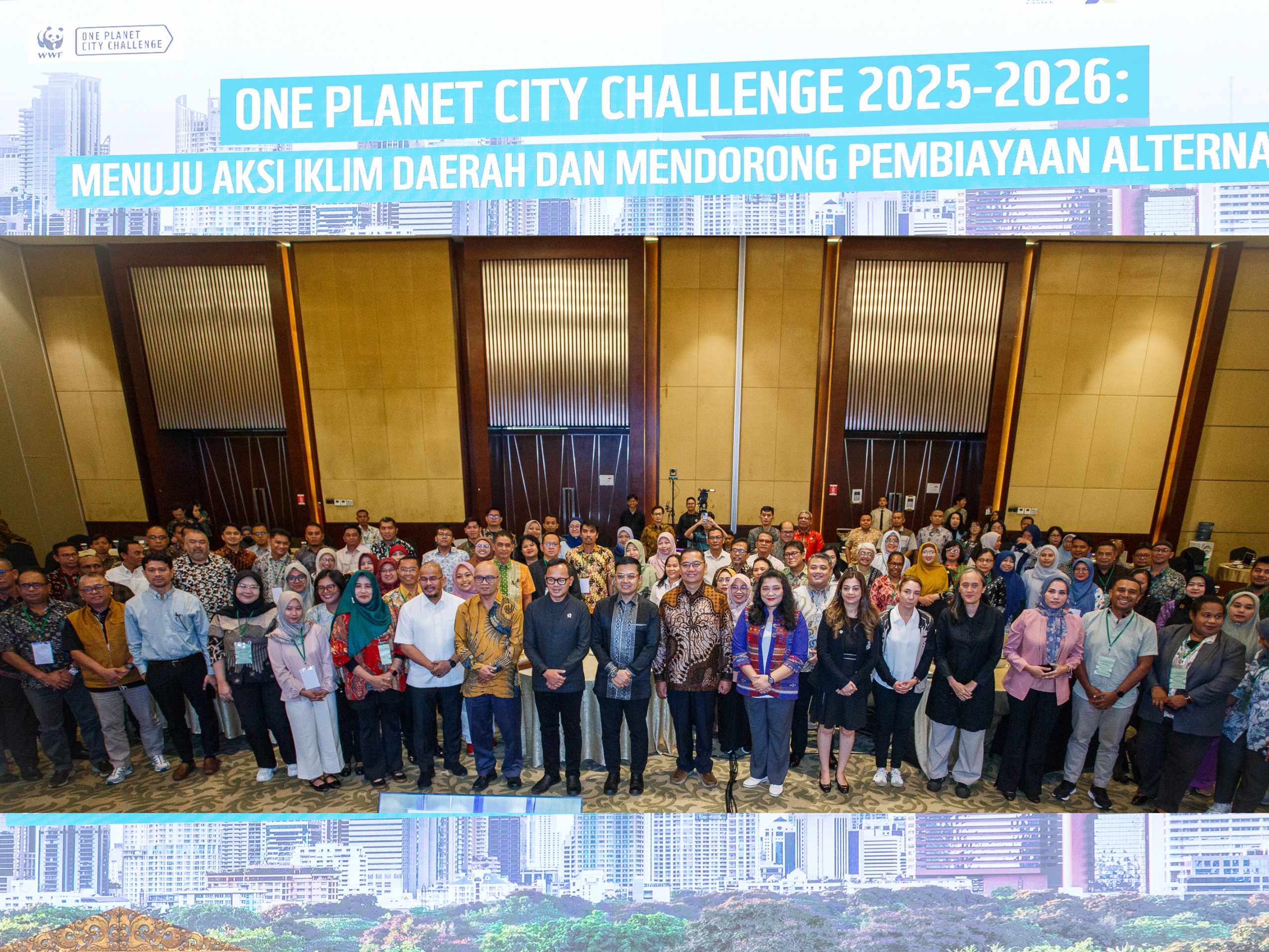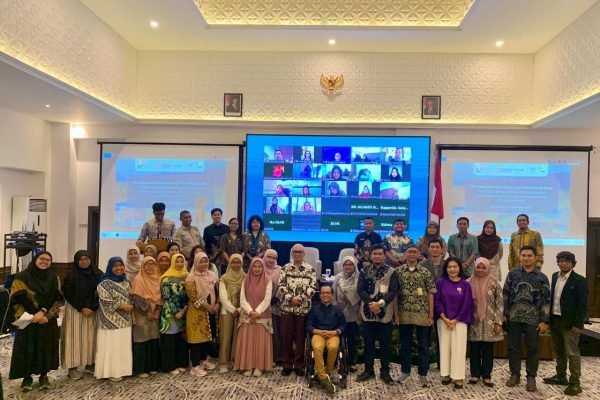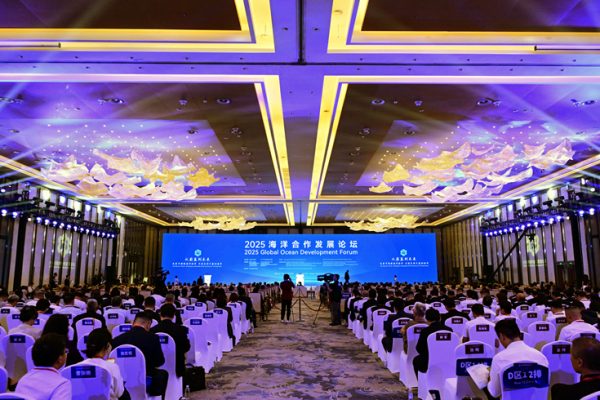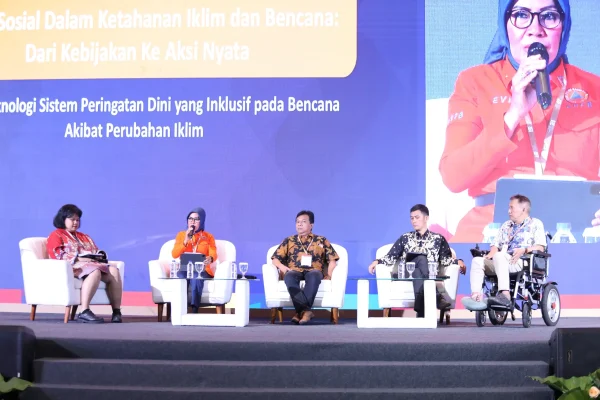In the picture: Center – Bima Arya, Vice Minister of Home Affairs, with the Mayor of Langsa City, Jeffry Sentana S. Putra, accompanied by over 100 participants during Day 2 of the event on 24 July 2025. Photo source: WWF Indonesia
19 Indonesian subnational governments disclosed 42 climate projects in the 2024 CDP-ICLEI Track reporting cycle—collectively worth USD 3.4 billion, with USD 1.9 billion still seeking funding. This data underscores the critical need for alternative financing to accelerate local climate efforts.
Calling for action, WWF-Indonesia, in collaboration with ICLEI Indonesia, Climate Disclosure Project (CDP), Association of Indonesian Municipalities (APEKSI), and Global Covenant of Mayors for Climate and Energy (GCoM) officially rolled out the 2025-2026 cycle of the One Planet City Challenge (OPCC) on 23-25 July 2025 in Serpong, South Tangerang, Banten Province.
The training event gathered over 100 local government representatives from 48 cities and regencies.
The One Planet City Challenge (OPCC), formerly the Earth Hour City Challenge, is a biennial competition and initiative for cities to report ambitious, innovative climate actions aligned with the Paris Agreement. This year’s launch brought in 6 new regencies and 18 new cities participating for the first time in the climate race.
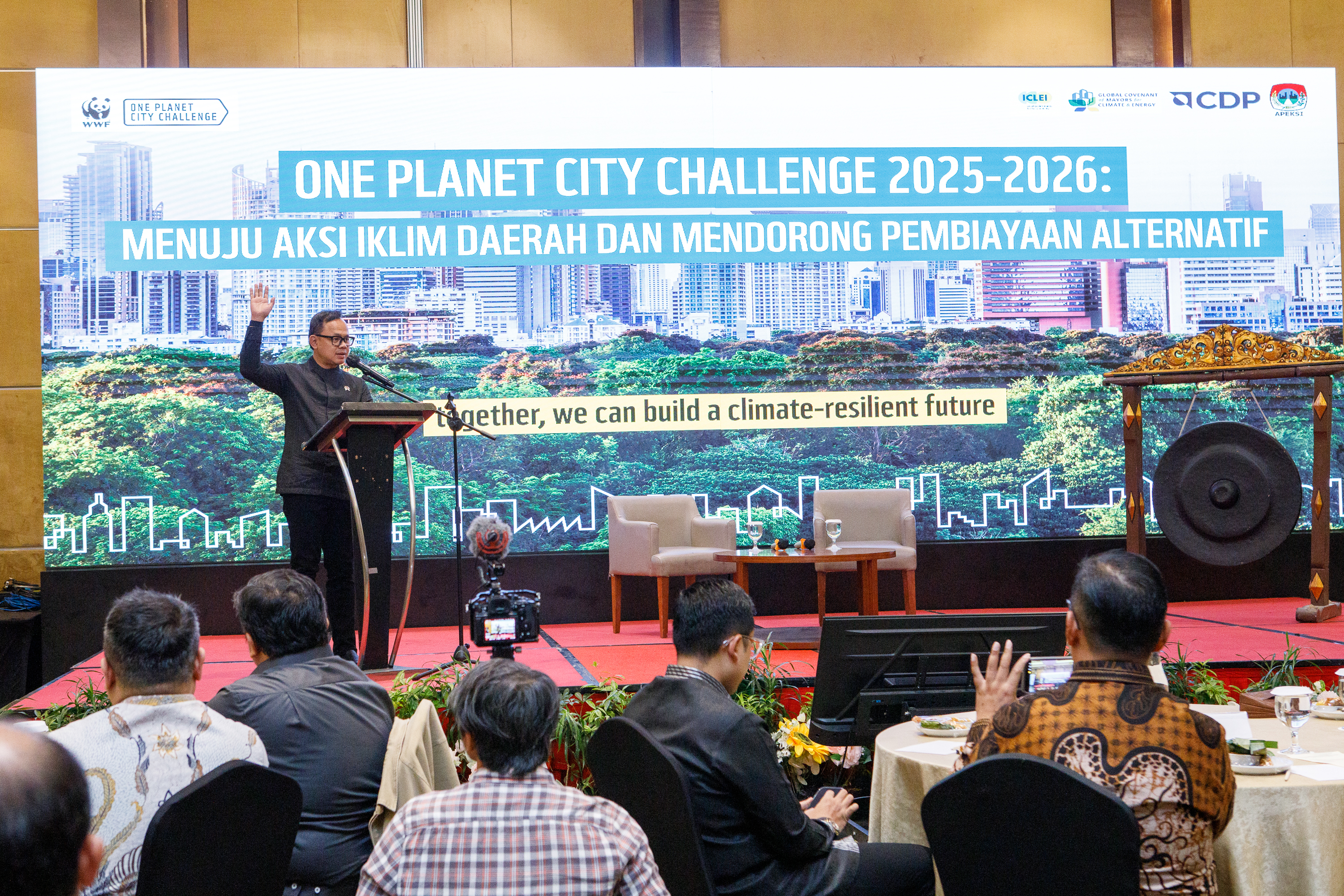
In the picture: Bima Arya, Vice Minister of Home Affairs, delivering welcoming remarks at the event attended by more than 100 local governments on July 26, 2026. Photo source: WWF Indonesia.
Vice Minister of Home Affairs Bima Arya led the rollout of the three-day program aimed at helping local governments develop measurable, evidence-based climate actions. He noted that climate priorities have been integrated into the Regional Government Work Plan (RKPD), mainly the medium-term development planning (RPJMD), and launched its sub-national reporting system.
“A key priority is to ensure that the RPJMD reflects measurable emissions reduction goals in line with Indonesia’s climate agenda,” the vice minister said, calling for unified action from the ground up and focus on the Triple Planetary Crisis: climate change, pollution, and biodiversity loss.
Sharing from his own experience as Mayor of Bogor City, Bima Arya noted how local efforts—like mitigating greenhouse gas emissions—can drive meaningful change in cities. Under his leadership, Bogor actively engaged as a pilot city in the Urban-LEDS II program with ICLEI.
Speaking for the Directorate of Carbon Economic Value (NEK) Governance at the Ministry of Environment, Upik Sitti Kamia, Coordinator for International Cooperation on NEK Governance, highlighted Indonesia’s push for net-zero, guided by Presidential Regulation No. 98/2021. This emphasizes integrating smart policies and climate action to align sustainable economic growth with environmental goals.
Aditya Bayunanda, CEO of WWF-Indonesia, encouraged local governments to strengthen science-based approaches in addressing urban climate challenges. “Following two years of OPCC activities, we hope cities will be able to develop mitigation actions based on their GHG inventories, aligned with the 1.5°C target, and access funding tailored to their local needs,” he said.
The Director of APEKSI, Alwis Rustam, reminded everyone that this platform isn’t just for training—it’s a space for policy advocacy and building partnerships. With updated regional development plans in progress, he said that now is the momentum to embed climate ambitions into local strategies.
Irfan Bakhtiar, Director of Climate and Market Transformation at WWF-Indonesia, reinforced the need for action-oriented planning. “Plans must lead to implementation,” he said, highlighting WWF’s Plastic Smart Cities initiative, which partners with pilot cities such as Bogor, Depok, and DKI Jakarta.
Unlocking innovative financing for local sustainability and waste reduction efforts
On Day 1, ICLEI Indonesia Country Manager Arif Wibowo moderated a panel titled “Enhancing Regional Climate Action Ambition through Integrated Planning and Innovative Financing: Opportunities, Challenges, and Best Practices,” highlighting NEK/Carbon Trading potential as an alternative financing for urban sustainable development.
Upik Sitti Kamia shared that regions with surplus emission reductions or verified offsets can join carbon trading. However, entities’ mitigation activities must be registered in the National Registry System (SRN-PPI). Additionally, they need a National Certification for GHG Emission Reduction (SPE-GRK) to qualify. Local governments are advised to establish a legal entity (Sub-national government-owned company or BUMD) or collaborate with businesses through Public-Private Partnerships (PPP) to access carbon trading and new funding opportunities.

Local governments, primarily represented by departments of environment and regional development, actively participated in keynote sessions, interactive discussions, and workshops during day 1 and 2 on 23-24 July 2025.
The panel also featured local leaders from Jambi and Probolinggo cities sharing practical insights on integrating climate action into city planning. They highlighted the importance of institutional readiness, community involvement, and cross-sector collaboration to drive real change on the ground.
Suhendri, Head of the Provincial Regional Development Planning Agency (Bappeda) in Jambi City, noted that corporate social responsibility (CSR) and private sector can provide an alternative funding source, possibly providing up to IDR 24 billion for climate action. The Kampung Bahagia Program targets full waste management coverage by 2026, with communities receiving IDR 260 million to manage neighborhood waste through Waste Processing Facilities (TPS3R) and sanitary landfills for residuals.
Diah Sajekti Widowati Sigit, Head of the Regional Development Planning Agency (Bappeda) in Probolinggo City shared how the city drives local climate action through strategic priorities, including strong political will from the mayor, inclusive stakeholder engagement, and clear regulatory measures. A key example is the city’s policy requiring developers to allocate 30% of built areas for green open spaces. The city keeps local voices at the center of planning by involving community members across all levels in local forums.
During the Q&A session, cities actively shared contextual insights to further the discussions. Sumbawa emphasized the need to kickstart a carbon calculation mechanism to support local carbon projects. Tambrauw, Samarinda, and Central Kalimantan also noted that, despite their vast forest areas, access to climate funding often remains centralized at the provincial level. They also shared local planning strategies aimed at meeting national green open space targets.
An afternoon panel session titled “Smart moves on waste: Collaboration in waste management as an effort to reduce GHG emissions,” focused on collaborative approaches to urban waste management aimed at reducing greenhouse gas emissions. Representatives from WWF-Indonesia spotlighted strategies for managing city waste, while the DKI Jakarta Environmental Agency shared insights on large-scale social collaboration in the waste sector.
Additionally, the Mataram Environmental Agency shared community involvement in upstream waste management. The private sector, including PT. Dulang Sirkular Nusantara and Alterna Verde, presented mechanisms for public-private partnerships, circular economy development, and the potential of alternative waste processing technologies.
Identifying funding gaps in local climate actions with CDP-ICLEI Track
Through the CDP-ICLEI Track platform, local governments in the OPCC employ an evidence-based approach by reporting emissions data and climate profiles.
During the last edition of OPCC, cities participating in the CDP-ICLEI Track and GHG Inventory training successfully established baselines, set emission reduction targets, and identified a USD 1.9 billion funding gap across 42 projects.
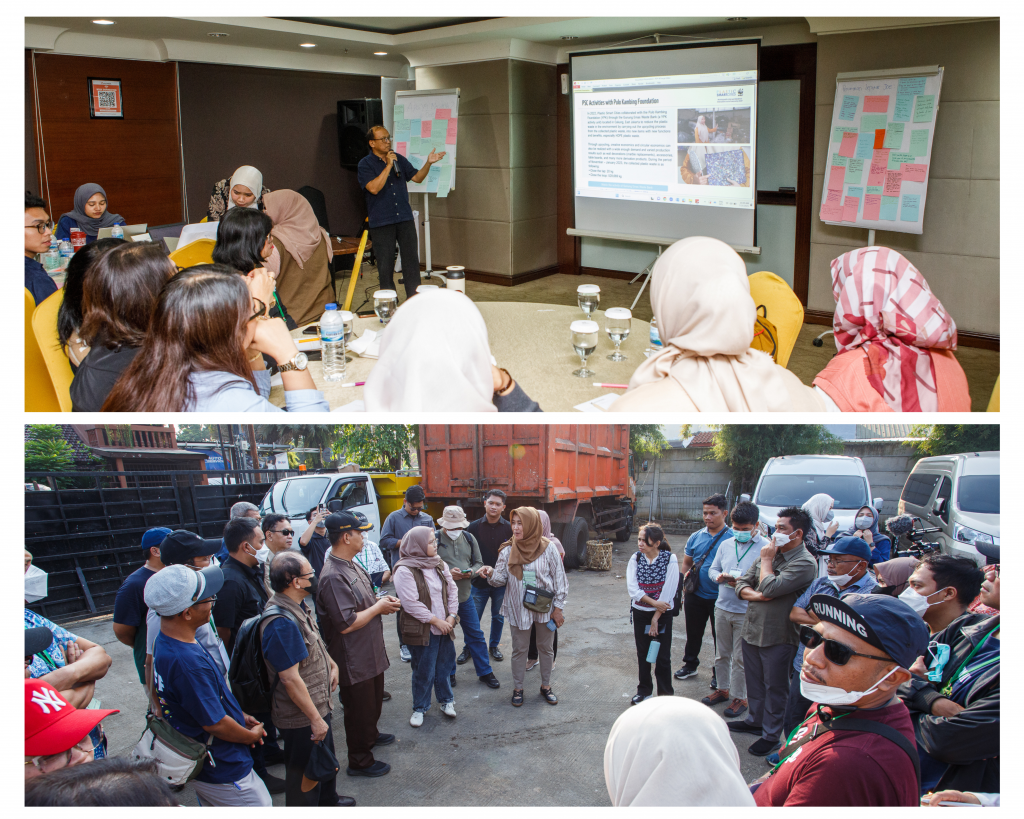
Local governments, primarily represented by departments of environment and regional development, actively participated in keynote sessions, interactive discussions, and workshops during day 1 and 2 on 23-24 July 2025.
Over the three days, the latest cycle’s launch program featured CDP-ICLEI Track training to strengthen climate data reporting, a climate finance and project preparation workshop to accelerate local action and address some of the aforementioned funding gap, and a site visit to TPS3R Joe to showcase sustainable urban waste management under the Plastic Smart Cities initiative.
On the third day, the morning climate finance workshop focused on helping subnational governments leverage alternative financing mechanisms to fund their climate projects and activities. ICLEI Indonesia presented a case study from a city-level carbon project and showcased the Urban Article 6 project in Yogyakarta , along with an introduction to ICLEI’s Transformative Actions Program (TAP). Other panelists from Kemitraan and Nawasena presented the options from Green Climate Funds and Nature-Based Solutions financing. In the afternoon, the session continued with presentations from C40 and CDP, an intensive dialogue, and exploration in accessing such alternative mechanisms.
Meanwhile, other city participants visited the Joe TPS3R facility, which manages plastic waste using the 3R approach—reduce, reuse, and recycle. This facility is a successful example from the Plastic Smart Cities program, a collaboration between WWF-Indonesia and its partners. It is expected that other cities and regencies will locally replicate this model as part of their efforts to reduce emissions from the waste sector.
As part of the OPCC competition cycle, local governments are encouraged to submit their CDP-ICLEI Track reports by mid-November. The evaluation process will continue until the national winners are announced in 2026. During this period, ICLEI Indonesia will support participating local governments by facilitating one-on-one virtual training sessions, assisting with report submissions, and reviewing the alignment of local climate targets with the goals of the Paris Agreement.

